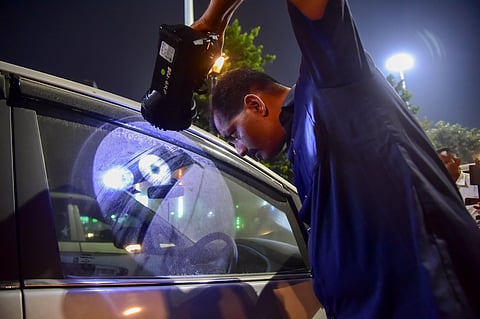Surat, Kashmir, Faridabad, Delhi: Tracing a terror trail to the Red Fort blast
In a string of alarming developments, three separate arrests across India and a powerful explosion in Delhi have raised fresh concerns about possible terror links.
In Gujarat, police detained a doctor carrying three handguns and materials that could be used to produce ricin — a lethal toxin capable of being turned into a biological weapon. In Haryana’s Faridabad, another doctor from Jammu and Kashmir was caught with nearly 2,900 kilograms of explosives, including 350 kilograms of ammonium nitrate and two assault rifles. Around the same time, a third doctor from Kashmir was arrested in Uttar Pradesh for putting up posters praising the banned Pakistan-based group Jaish-e-Mohammed.
These incidents unfolded between Sunday night and Monday morning. By Monday evening, Delhi was jolted by a high-intensity explosion near the Red Fort.
A white Hyundai i20 bearing Haryana registration number HR26 CE 7674 exploded at a traffic signal near Gate 1 of the Lal Qila metro station, killing nine people and injuring twenty others. The impact set ablaze 22 nearby vehicles and left a trail of devastation.
Whether the arrests in Gujarat, Haryana, and UP are linked to the Red Fort blast is still unclear. Home Minister Amit Shah, after visiting the site, refrained from speculation, confirming only that a high-level inquiry involving the NIA, NSG, and Delhi Police Special Cell has been initiated. “All possibilities are being examined,” he said briefly.
The Gujarat Arrest
Gujarat’s Anti-Terrorism Squad apprehended Dr. Ahmed Mohiyuddin Saiyed from Adalaj, near Gandhinagar, on Sunday. Officers seized two Austrian Glock pistols, an Italian Beretta, and ammunition, along with four litres of castor oil — a precursor for making ricin. Investigators suspect he had begun preliminary research and preparation for a possible toxin-based attack in Delhi, Lucknow, or Ahmedabad.
According to ATS sources, Saiyed, described as “highly educated but radicalised,” was allegedly in touch with members of the Islamic State-Khorasan Province (ISKP), a group notorious for its brutal strikes in Afghanistan and Pakistan.
Explosives Found in Haryana
Almost simultaneously, a J&K Police team raided two homes in Faridabad belonging to Dr. Mujammil Shakeel, seizing around three tonnes of explosive materials, detonators, rifles, and ammunition. Shakeel, affiliated with Al-Falah Hospital, was the second doctor arrested after Dr. Adil Ahmad Rather from Uttar Pradesh’s Saharanpur. CCTV footage had shown Rather and Shakeel putting up Jaish-e-Mohammed posters in Nowgam, Kashmir.
A third doctor, Shaheen Shahid, was later arrested for allegedly storing a rifle and ammunition belonging to Shakeel in her car. Investigators said the quantity of ammonium nitrate seized could have caused massive destruction within a hundred-metre radius if detonated.
Kashmir Links Emerge
Another police team in Anantnag recovered an assault rifle and ammunition from a locker assigned to Rather at the Government Medical College, where he worked until late 2023. Meanwhile, one of the registered owners of the car used in the Delhi blast has been identified as Tariq, a resident of Pulwama, Kashmir.
However, authorities cautioned that vehicle ownership records in India are often outdated, as cars are frequently sold without updating registration details. The car’s original owner, Salman, is now in police custody.
The Delhi Blast Investigation
Investigators believe the explosion originated from the rear section of the Hyundai i20. The National Investigation Agency, National Security Guard, and Delhi Police’s Special Cell are jointly probing the case. Delhi and its neighbouring states — Uttar Pradesh, Rajasthan, and Bihar — have been placed on high alert. Maharashtra, Tamil Nadu, and the India-Nepal border regions have also tightened security in response.
Though no direct link has yet been established between the detained suspects and the Red Fort explosion, the timing and nature of these incidents have placed law enforcement on edge. The capital, still recovering from the shock, remains under intense surveillance as investigators piece together what could be one of the most complex terror probes in recent years.
.png)


